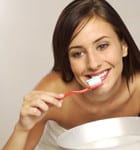 Brushing your teeth is something you learn when you are very young, but it never stops being important. Brushing is the most effective way to remove plaque and bacteria from the mouth, helping to keep your mouth clean and fresh. It also reduces the risk of dental health problems, such as gum disease, decay, bad breath and staining.
Brushing your teeth is something you learn when you are very young, but it never stops being important. Brushing is the most effective way to remove plaque and bacteria from the mouth, helping to keep your mouth clean and fresh. It also reduces the risk of dental health problems, such as gum disease, decay, bad breath and staining.
How often should I brush my teeth?
Dental polls show that many people skip brushing their teeth –this is not advisable and we recommend that all our patients to brush their teeth twice a day. Most people find it convenient to brush in the morning and before they go to bed, while some also like to brush after lunch to prevent bad breath.
How long should I brush for?
It is important that you brush your teeth thoroughly. Simply dusting over your teeth will not do the job, so try to aim for at least two minutes of brushing, twice a day. If you struggle to stick to a 2 minute brushing period, try using a toothbrush that has a timer.
Brushing technique
When you brush your teeth it is important to cover all areas of your mouth. Tip the head of the brush to a 45 degree angle, polish the teeth and remember to brush along the gum line, as this is a common place for bacteria to gather. Brush the teeth with circular motions and take care not to brush too hard, as this can damage the surface enamel of the teeth and the gums. If you find that your gums are bleeding during brushing, this may mean that you are brushing too hard.
Manual toothbrushes versus electric toothbrushes
Manual toothbrushes have been around for decades and they can do a highly effective job – but electric toothbrushes remove more plaque, can be easier to use and many come with additional features, such as different brushing modes and a timer. If you have any questions about choosing a toothbrush, ask our friendly dentists in Central Leeds.
 Herbal medicine has been around for centuries and some people firmly believe in the healing properties of natural substances. For those who prefer to try natural remedies before taking medication or undergoing invasive treatment, here are some remedies for common dental problems:
Herbal medicine has been around for centuries and some people firmly believe in the healing properties of natural substances. For those who prefer to try natural remedies before taking medication or undergoing invasive treatment, here are some remedies for common dental problems:













